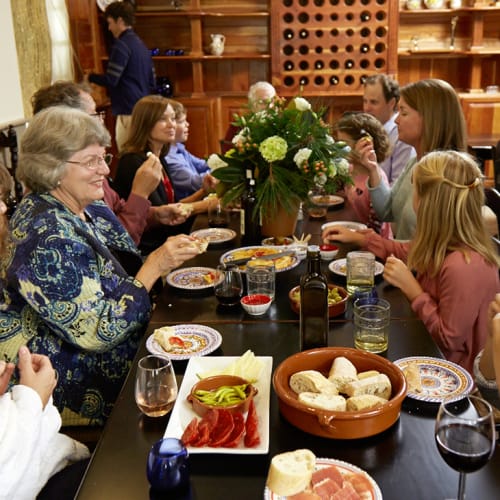Save on Chocolates for Your Valentine! Shop Sale
Sobremesa: Spain's Joyful Feasting Tradition
Jonathan Harris | October 2024




Right now, our family is gathering in an old farmhouse on the island of Menorca, celebrating an important anniversary together. Aunts and uncles, grandparents and friends will be gathered around a big table, sharing the amazing foods of the Balearic Islands. I have visions of coca flatbreads, roasted lamb and ensaimada pastries dancing in my head!
After a big feast, we will undoubtedly linger at the table, telling stories about our lives and travels. This special time, when the dishes have been cleared and everyone relaxes together, is so important in Spain that they have a name for it: sobremesa.
Sobremesa literally means “over the table.” But its true meaning is much more profound than that. This is a time spent connecting with others, renewing bonds and enjoying a sense of community. There is no rush! Everyone chats and digests, relaxes and enjoys each other’s company. And while sobremesa is longer and more leisurely on weekends, even weekday business lunches can have sobremesa.
In Spain, how you eat is as important as what you eat. Food is always a part of the joy, but sharing time with others is a celebration and a time for connection. Sobremesa is such a part of the meal that, if you are at a Spanish restaurant, you won’t get a check until you ask for it.
When our father, Don, first stepped ashore in Valencia as a young chaplain, he was profoundly moved by the way the Spanish people treated meals as such a central part of life. He was amazed to see extended families feasting together, and how the children were included even at late night dinners. He felt like this was his true home, where families are full of warmth and connection and the children are treasured.
Spanish meals, and sobremesa in particular, are not quiet affairs. As friends and extended family talk enthusiastically, I’ve often witnessed the kids playing and exploring at restaurants alongside the table, bonding in their own way. In fact, Spanish families are so boisterous that some visitors complain that restaurants are overly loud and chaotic. But I think this is the heart of what is so special about the people of Spain. Gatherings should be joyful and fun, full of talk and connection.
Because the Spanish live in densely populated towns and cities, typically in apartments and smaller homes, life is enjoyed out in the larger community, gathering at cafes, tapas bars and restaurants. Often no car is needed – people can walk out their doors and stroll to the neighborhood bar to see old friends and extended family on a daily basis. It’s much less common to drive your car 30 minutes to your house after work and shut the door for the evening, as is so common in the United States.
For me, sobremesa is a perfect example of what makes Spain so special. At its best, Spanish culture is about enjoying life and connecting deeply with your community. And if that takes place after a long, delicious feast full of incredible Spanish food, all the better! We hope that we can help bring the spirit of sobremesa to your home.

¡Hola! I'm Jonathan Harris, one of the owners of La Tienda. I love sharing insights about Spain's amazing food culture.
Learn more >

